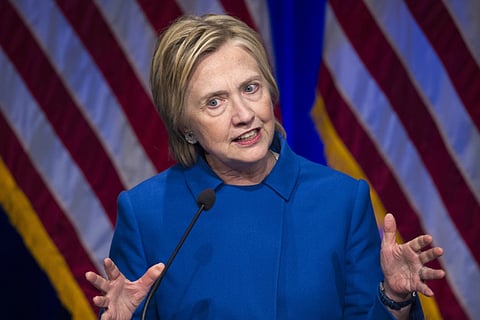Clinton prosecution would set a terrible example
US Department of Justice, which has a proud history of being independent from political partisanship, should act in an impartial manner

The United States Justice Department’s declaration that Attorney General Jeff Sessions is considering appointing a special counsel to investigate Hillary Clinton in response to demands by Republicans should alarm anyone who cares about the independence of the department. The department had sent a written response to letters from House Judiciary Chairman Bob Goodlatte (Republican, from Virginia), requesting investigations into “a plethora of matters connected to the 2016 election and its aftermath”. Sessions confirmed the content of the Department of Justice (DOJ) letter before the House Judiciary Committee.
The proposal reads like a laundry list of Republican grievances about Clinton and former FBI director James Comey — Clinton’s role in approving the sale of a Canadian uranium company to Russia, international dealings of the Clinton Foundation, the FBI’s reliance on a dossier compiled by Fusion GPS in its investigation of the Trump campaign and the FBI’s handling of the investigation of Clinton’s private email server, among other things — all pet causes of US President Donald Trump’s political base.
As a former US attorney who now teaches criminal law and national security, I find the department’s move troubling for three reasons.
First, the response tends to undermine the Justice Department’s independence by suggesting that it makes investigative decisions based on political considerations. The DOJ has a proud history of being independent from political partisanship. In fact, the department has a policy precluding its personnel from communicating directly with Congress or the White House except at the very highest levels, to prevent any political meddling in charging decisions. This letter, to the contrary, harms public confidence in the department’s commitment to making investigative decisions based on facts and law instead of political considerations. Even the appearance of pandering to political demands by Congress damages public confidence in the department’s objectivity.
If the letter were only responding to Congress, it would be odd enough. But Trump has made public comments about investigating Clinton that make the department’s actions even more ominous. Trump has recently said that it was “very discouraging” that Justice was not “going after Hillary Clinton”. This letter creates the perception that federal prosecutors are either taking orders from the president or seeking to curry favour with him by acceding to his wishes. Trump has expressed his desire to put Clinton “in jail” since last year’s campaign, and has expressed his disappointment with Sessions for his failure to investigate her conduct. While top leaders at the DOJ are appointed by the president, they are not his personal lawyers. Any investigation into Clinton or her campaign must be based on objective criteria, not on an attempt to “go after” a president’s political opponent.
I recall vividly a meeting at the White House between the administration of former president Barack Obama and all of the US attorneys Obama had appointed. During that meeting, Obama told us all to remember that we serve the Constitution and the people and not him. Trump either doesn’t understand this concept or doesn’t care about it.
Even if this letter is simply an attempt to fend off critics by stating that a review is under way, while knowing full well that no charges will materialise, such a tactic would be an inappropriate use of the legal tools of the DOJ — it’s a disingenuous approach that tarnishes the integrity of the people who wield these tools.
Second, the letter seems to violate Sessions’s own recusal order. In March, Sessions recused himself from “any existing or future investigations of any matters related in any way to the campaigns for President of the United States”. Pursuant to department policy, Sessions properly removed himself from such matters because of his personal participation in the Trump campaign. This new letter, stating that senior prosecutors will evaluate issues and report to him, seems to clash with his own decision. Government lawyers must abide by ethical rules at all times, not only when the rules suit their purposes.
Third, the timing of the letter is also concerning. Just as the investigation by special counsel Robert Mueller is heating up, this letter provides fodder for conservative news commentators to talk about the investigation into Clinton and the president’s other enemies as if there were a real parallel between them. The initial letter from Goodlatte came in July, with a follow-up in September. Only now has the DOJ deemed the issue worthy of a public, written response. Not only does the reply come at a time when it can help dilute some of the attention from the Russia probe, it also arrived just before Sessions testified before the House Judiciary Committee, where he could expect some uncomfortable questions about his prior testimony regarding communications between Russia and the Trump campaign. This letter gives Sessions other things to talk about instead.
It may be that investigations into some or even all of these matters are appropriate, or that Sessions and Rosenstein eventually conclude that insufficient evidence of crimes exist to merit prosecution. But the US public has grown so justifiably sceptical of disrespect for their institutions of government that it is hard to avoid being cynical when some outrageous wishes suddenly appear to becoming true. We should all hope that Sessions and Rosenstein are not being used to appease Trump when he needs them most, and that they will withstand efforts to draw the DOJ into the political abyss.
— Washington Post
Barbara McQuade is a Law professor at the University of Michigan Law School and the former US attorney for the Eastern District of Michigan.


